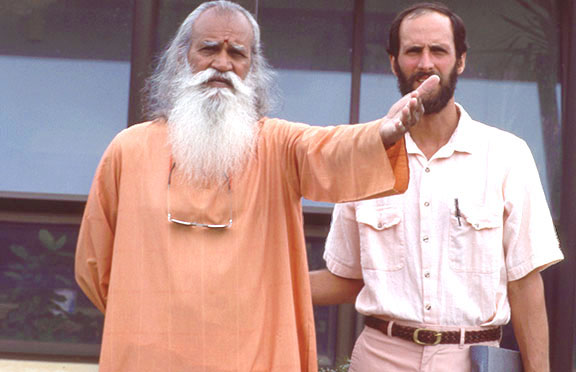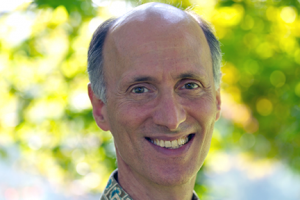 In this article, Steven Shankara Bookoff, former president of Satchidananda Ashram and current chief financial officer of Organic India shares lessons he learned directly from Swami Satchidananda (Sri Gurudev) about business and finance done the yogic way.
In this article, Steven Shankara Bookoff, former president of Satchidananda Ashram and current chief financial officer of Organic India shares lessons he learned directly from Swami Satchidananda (Sri Gurudev) about business and finance done the yogic way.
I’ll never forget when we were considering an investment that could bring a big financial payout to the Ashram. We were weighing the risks and benefits of this investment and when it came time to make the decision, Sri Gurudev said no. He explained, “We don’t want to worry about losing money. We want to earn what money we can without losing our principle. We care more about our peace.” After I left the Ashram, I always relied on this precept: All investments have risk, but put one’s peace of mind as the number one criteria before investing. I always ask myself, “If it doesn’t do well, can I still maintain my peace?” I look at the amount, the risk and what I could lose. Maintaining one’s peace of mind was one of Sri Gurudev’s fundamental teachings.
As a spiritual teacher, Sri Gurudev placed each student’s spiritual growth above all else. He believed that spirituality needed complete freedom. He may have offered advice, but it was up to the individual whether or not to follow the advice. He didn’t believe in holding onto students either—even if they were serving in important roles in the Ashram. If they needed to move on, to experience something else, he always supported them in doing what they wanted to do. In that context, there was a difficult personnel decision to be made that impacted whether someone would stay in a certain position of service at the Ashram. Gurudev advised me, “You have to think of what is best for the organization. You can’t make the decision based on what is best for the individual.” When it came to business decisions, he placed emphasis on what was best for the organization. I found many applications for this advice in the business world. Like most spiritual seekers, I have a lot of compassion and love for the people I work with. It’s not always easy, if someone is not working out, to tell the person we can no longer use their services. I had to realize that I had to make decisions that were best for the company, because ultimately, everyone else, and the business itself, is impacted if one person isn’t working out.
Sometimes Sri Gurudev taught us a lesson in a way that felt a bit exaggerated at the time—almost out of proportion to what occurred. But yet, it had such an incredible impact that those are the lessons that not only did I learn well, but I was able to apply in a much broader context in the future. For example, there was a time when we were doing a lot of construction and we had a lot of heavy equipment on site. We were doing some construction on the LOTUS lake and had the water in it drained. Gurudev drove down to the lake to see how the work was progressing and, in the process, his jeep got stuck in the lake. I think he really enjoyed that. All of us got to practice both maintaining our equanimity and trying to be dynamic in our response to this situation of the jeep being stuck.
I asked Gurudev if I should get Joe, one of the heavy equipment operators we had hired, to pull the jeep out with his winch. “That would be good,” Gurudev said. So, I quickly ran in the direction of where I thought Joe would be working and about 10 minutes later, having found him, returned with Joe to the lake. As we started to pull the jeep out of the mud, I became intently aware that Gurudev seemed to be “using anger” with me. I wasn’t really sure what I had done to get that reaction. But, I knew, from the looks he was giving me, that I did something wrong. As we’re pulling the jeep out, Sri Gurudev asked me, “Why did you get Joe?” I replied, “I thought that’s what you wanted.” Gurudev explained, “Even if I had wanted you to, I didn’t want you to come with the backhoe because Joe would charge the hourly rate for operating heavy equipment. I’d rather he used his pickup truck. Without fully understanding, you are just ready to go and act.”
Gurudev’s words, particularly “fully understanding” really struck me. I’ve seen many instances, since leaving the Ashram, that the company I was working with was making a decision without fully understanding all aspects of a situation. Remembering Gurudev’s words, I’ve been able, at times, to call attention to the fact, when the decision being made is too significant and requires us to delve more deeply and consider all aspects in order to assure that we are making a fully informed decision. So that was an incredibly deep lesson for me.
A little later that same day after the jeep got unstuck, we were working on the upper portion of the LOTUS road, which was under construction. Sri Gurudev was operating a grader with Joe. I was in front of the grader pulling out rocks and roots to get them out of the way to make it easier for the grader. I was enjoying the activity. I was translating between Joe, who was an outside contractor with quite a thick, southern accent and who may have had some tobacco chew in his cheek. As he would speak, I would interpret for Gurudev what Joe said and I was doing the same to make it easier for Joe to understand Sri Gurudev’s accent. At some point, I was trying to lighten the mood and said, “Gurudev, Joe doesn’t seem to understand us.” Gurudev replied, “Well, when even we can’t understand each other, how do we expect others to understand us.” That again was an amazing lesson that I’ve been able to apply in my other business activities. It’s so easy to think the source of a misunderstanding is someone else. As Sri Gurudev often said, when you point at someone else, three fingers point back at you. I realized that I need to make sure I am communicating clearly, that I am understanding the other person and the situation. It’s been a very deep lesson that helps me to better understand someone else’s perspective. Often, the person who is doing the job, understands it better than an executive in the company. There’s a lot to be gained in understanding the person, what situations they are faced with, what they see as the opportunities and the threats to the company.
Sri Gurudev often emphasized that good business people puts themselves in the place of their customers. With Gurudev, the “win-win” wasn’t a marketing tool or expression, because he saw the divine in all. When you do that, you want to be sure to both make a fair profit and be fair to the customer. I certainly try to live that way in the work I do. I’m fortunate now that, for the past eight years, I work for Organic India, a company that is trying to make a real difference in the world. We’re promoting organic farming and sustainability for small farmers in India. We promote social justice through the decisions we make about those we employ and the opportunities for the people in our company. We promote equality. It’s an honor to work for this company. We are not trying to squeeze anyone. Most businesses are trying to squeeze everyone. I see that Sri Gurudev’s teaching of universal love is really the basis of good business. Then, it’s not a matter of trying to be a certain way because it’s the right thing, it becomes a natural expression of a business owner’s love for the planet earth, love for all the people of the earth.
This reminds me of an example of Sri Gurudev’s love in action. One day, one of the local telephone repairmen was working on the LOTUS reception building. He’d been to the Ashram many times, doing a lot of installations in various buildings. He knew Sri Gurudev from Gurudev’s many visits to the various construction projects. On this one afternoon, Gurudev, when talking to this repairman said, “Excuse me for saying this, but don’t you think it would be good if you stopped chewing tobacco?” The man replied, “Yes, I know it’s my one bad habit and it’s hard for me to give it up.” Sri Gurudev spoke to him with such love and respect explaining, “I feel like you are a part of our family and I don’t want to see you doing anything that is hurting your health.” The man was so visibly moved that he was brought to tears. He was touched not just by Gurudev’s words, but also by the depth of the feelings that he was expressing. This man really got it and he said, “This world would be such an amazing place if each person treated everyone else like family.”
That is the feeling we have at Organic India. The farmers are our family. There’s not a we and them, there’s an us. I feel our company is gifted because of the beauty and universal love exemplified by the owners, Bhavani and Bharat Mitra Lev. I think the universe is pleased that we’re trying to do some good. The company is not driven by selfishness, but by real love, concern, compassion, respect and gratitude for the people with whom we are involved and planet earth. I think this is the real Yoga of business.
About the Author:

Steven Shankara Bookoff served as president of Satchidananda Ashram-Yogaville from 1983 through 1990. He has been the CFO of Organic India since 2002. He also volunteers as an officer and director of the Bet Lev Foundation, a private foundation in the USA and as a Board member of Smith Center for Healing and the Arts.

